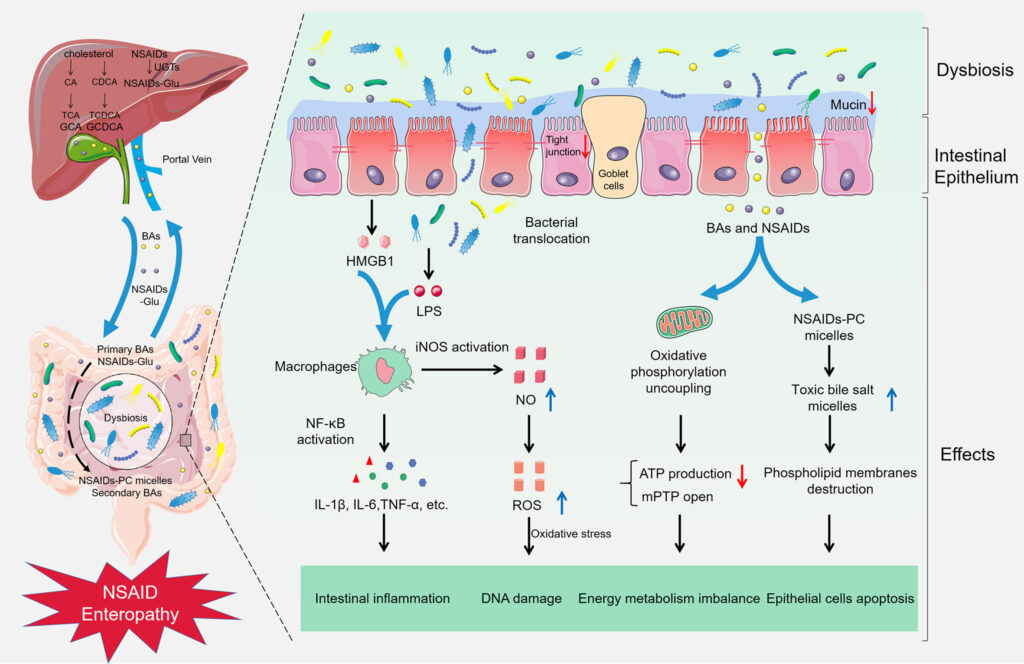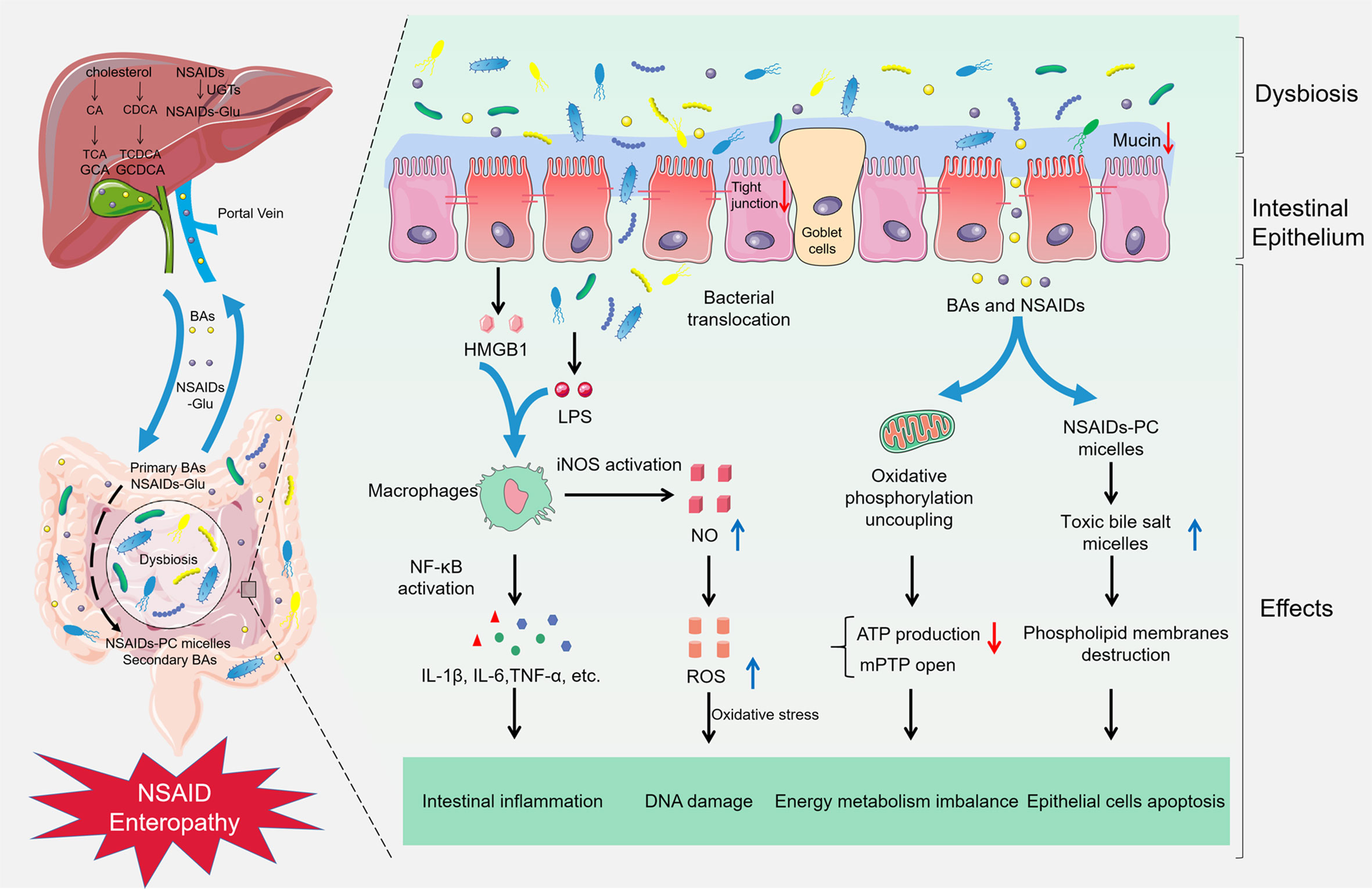
Ibuprofen and Gut Health: Understanding the Connection
Ibuprofen, a common over-the-counter pain reliever, is frequently used to alleviate headaches, muscle aches, and inflammation. While effective for these purposes, it’s crucial to understand the potential impact of ibuprofen on gut health. This article delves into the intricate relationship between ibuprofen consumption and the delicate balance of the gut microbiome, exploring the potential risks and offering strategies for mitigating adverse effects.
What is Ibuprofen?
Ibuprofen belongs to a class of drugs known as nonsteroidal anti-inflammatory drugs (NSAIDs). It works by reducing the production of prostaglandins, substances in the body that contribute to pain and inflammation. While ibuprofen can provide significant relief, it’s essential to be aware of its potential side effects, particularly concerning gut health.
The Gut Microbiome: A Brief Overview
The gut microbiome is a complex ecosystem of trillions of bacteria, fungi, viruses, and other microorganisms residing in the digestive tract. This community plays a vital role in various aspects of health, including digestion, nutrient absorption, immune function, and even mental well-being. A healthy and balanced gut microbiome is essential for overall health.
How Ibuprofen Affects Gut Health
The impact of ibuprofen on gut health is multifaceted. Here are some key ways ibuprofen can affect the gut:
Increased Intestinal Permeability (Leaky Gut)
One of the primary concerns with ibuprofen use is its potential to increase intestinal permeability, often referred to as “leaky gut.” The intestinal lining acts as a barrier, preventing harmful substances from entering the bloodstream. Ibuprofen can disrupt this barrier, leading to increased permeability and allowing bacteria, toxins, and undigested food particles to leak into the bloodstream. This can trigger inflammation and immune responses throughout the body.
Disruption of the Gut Microbiome Balance
Ibuprofen can also alter the composition of the gut microbiome. Studies have shown that NSAIDs like ibuprofen can reduce the diversity of beneficial bacteria in the gut, while potentially promoting the growth of harmful bacteria. This imbalance, known as dysbiosis, can lead to various digestive issues and compromise immune function.
Increased Risk of Ulcers and Gastrointestinal Bleeding
Ibuprofen is known to irritate the stomach lining and increase the risk of ulcers and gastrointestinal bleeding. This is because ibuprofen inhibits the production of prostaglandins, which protect the stomach lining from acid damage. Prolonged or excessive use of ibuprofen can significantly increase this risk. [See also: Managing Stomach Pain After Taking Ibuprofen]
Inflammation in the Gut
While ibuprofen is intended to reduce inflammation, it can paradoxically contribute to inflammation in the gut. By disrupting the gut barrier and promoting dysbiosis, ibuprofen can trigger an inflammatory response in the digestive tract. This inflammation can exacerbate existing gut issues and contribute to chronic conditions.
Symptoms of Ibuprofen-Related Gut Issues
The symptoms of ibuprofen-related gut issues can vary depending on the severity of the damage. Some common symptoms include:
- Abdominal pain
- Bloating
- Gas
- Diarrhea
- Constipation
- Heartburn
- Nausea
- Vomiting
- Fatigue
In more severe cases, ibuprofen-induced gut damage can lead to ulcers, gastrointestinal bleeding, and even anemia.
Who is at Risk?
Certain individuals are at a higher risk of experiencing ibuprofen-related gut issues. These include:
- Individuals with a history of ulcers or gastrointestinal bleeding
- Older adults
- People taking other medications that can irritate the gut, such as aspirin or corticosteroids
- Individuals with pre-existing gut conditions, such as inflammatory bowel disease (IBD)
- Those who frequently use ibuprofen or take high doses
Strategies to Protect Your Gut While Taking Ibuprofen
While it’s best to minimize ibuprofen use whenever possible, there are strategies you can employ to protect your gut if you need to take it:
Take Ibuprofen With Food
Taking ibuprofen with food can help to reduce its direct contact with the stomach lining and minimize irritation. Food can act as a buffer, slowing down the absorption of ibuprofen and reducing its concentration in the stomach.
Use the Lowest Effective Dose
Use the lowest dose of ibuprofen that provides adequate pain relief. Avoid taking more than the recommended dose, as this can increase the risk of side effects. It’s also important to limit the duration of ibuprofen use. Don’t take it for longer than necessary.
Consider Alternatives
Explore alternative pain relief options, such as acetaminophen (Tylenol), topical pain relievers, or natural remedies like turmeric or ginger. [See also: Natural Alternatives to Ibuprofen for Pain Relief] Consult with your doctor or pharmacist to determine the best option for your specific needs.
Probiotics and Prebiotics
Probiotics are beneficial bacteria that can help to restore balance to the gut microbiome. Taking a probiotic supplement may help to counteract the negative effects of ibuprofen on gut health. Prebiotics are foods that feed beneficial bacteria in the gut. Consuming prebiotic-rich foods, such as garlic, onions, and bananas, can also support a healthy gut microbiome.
L-Glutamine
L-glutamine is an amino acid that plays a crucial role in maintaining the integrity of the intestinal lining. Supplementing with L-glutamine may help to repair damage to the gut barrier and reduce intestinal permeability caused by ibuprofen.
Bone Broth
Bone broth is rich in collagen, gelatin, and other nutrients that can support gut health. Drinking bone broth regularly may help to heal and protect the intestinal lining.
Manage Stress
Stress can negatively impact gut health. Practicing stress-reducing techniques, such as yoga, meditation, or deep breathing exercises, can help to protect your gut while taking ibuprofen.
When to See a Doctor
If you experience persistent or severe gut symptoms while taking ibuprofen, it’s important to see a doctor. They can assess your condition, rule out other potential causes, and recommend appropriate treatment. Seek immediate medical attention if you experience signs of gastrointestinal bleeding, such as black, tarry stools or vomiting blood.
Conclusion
While ibuprofen can be an effective pain reliever, it’s essential to be aware of its potential impact on gut health. By understanding the risks and implementing strategies to protect your gut, you can minimize the adverse effects of ibuprofen and maintain a healthy digestive system. Always consult with a healthcare professional before taking ibuprofen, especially if you have pre-existing gut conditions or are taking other medications. Prioritizing gut health is crucial for overall well-being, and making informed choices about medication use is an important step in that direction. Remember to consider alternatives to ibuprofen when possible and focus on maintaining a healthy lifestyle to support a thriving gut microbiome.

